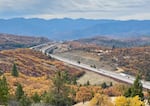
This undated artist's rendering from the Oregon Department of Transportation shows the design of an overpass crossing for wildlife spanning above four lanes of traffic on I-5, looking southeast. ODOT is expected to begin construction on the crossing in 2028 in the Cascade-Siskiyou National Monument, less than two miles north of the California border.
Oregon Department of Transportation
The Oregon Department of Transportation recently learned it will receive a $33 million grant from the federal government to build a wildlife crossing overpass on I-5 in Southern Oregon.
It will be the first overcrossing built to reduce wildlife and vehicle collisions along I-5, which spans nearly 1,400 miles from the Washington-Canada border to the California-Mexico border.
ODOT, which is providing nearly $4 million in matching funds for the project, removes about 6,000 deer carcasses struck by motorists each year in Oregon.
Wildlife corridors can not only prevent fatalities but also save motorists thousands of dollars in vehicle repairs – on average, $9,000 for a collision with a deer and $24,000 for elk, according to the agency.

In December 2024, the Oregon Department of Transportation announced it had received a $33 million federal grant to build the first overpass wildlife crossing on I-5. This undated photo shows the proposed location for the overpass which is expected to begin construction in 2028 in Southern Oregon, less than two miles north of the California border.
Oregon Department of Transportation
Karen Mager, an associate professor of environmental science, policy, and sustainability at Southern Oregon University in Ashland, has led a team of undergraduate students to set up camera traps and collect more than a million videos and photos of the diverse wildlife that live along the I-5 corridor south of Ashland, in the Cascade-Siskiyou National Monument.
“We have mountain lions, coyotes, bears, bobcats, Pacific fishers. We’re at the northern edge of the ringtail, which is this really cool kind of raccoon relative, and so we have a lot of diversity here,” she said.
The images Mager and her students captured were critical to identifying the future location of the overpass within the Mariposa Preserve of the Cascade-Siskiyou National Monument, less than two miles from the California border.
The crossing will essentially be a wide bridge arching above the north and southbound lanes of the freeway, designed with natural features such as native vegetation and high walls to dampen the roar from traffic passing below while keeping animals safe.

This undated artist's rendering from the Oregon Department of Transportation shows the design of an overpass crossing for wildlife spanning above four lanes of traffic on I-5, looking southwest. ODOT is expected to begin construction on the crossing in 2028 in the Cascade-Siskiyou National Monument, less than two miles north of the California border.
Oregon Department of Transportation
“The bridge itself is actually going to be connected to a couple miles of fencing to the north and to the south that help funnel animals towards the wildlife crossing. …. It’s got these jump outs on it so that if an animal accidentally ends up in the freeway, they can easily jump out to the safe side of the fence, but animals on the safe side of the fence won’t be able to easily get into the highway,” Mager said.
Construction of the wildlife crossing is expected to begin in early 2028.
“The overpass will be kind of an amazing, beautiful ‘Welcome to Oregon’ statement as you drive in from California, and it’s going to have artwork on it,” Mager said.
Karen Mager spoke to “Think Out Loud” host Dave Miller. Click play to listen to the full conversation:
